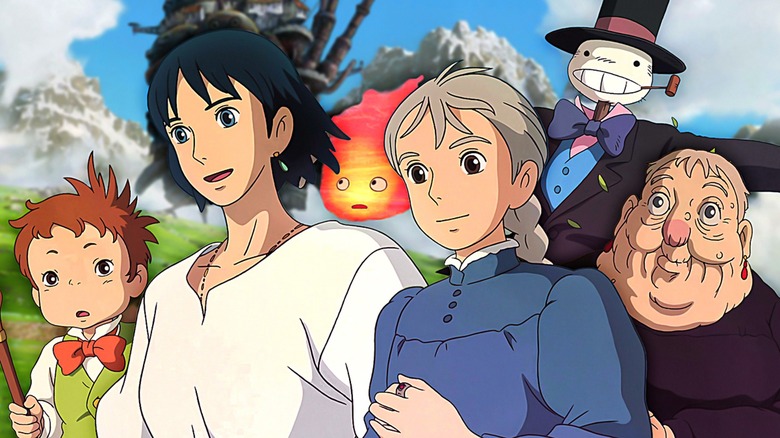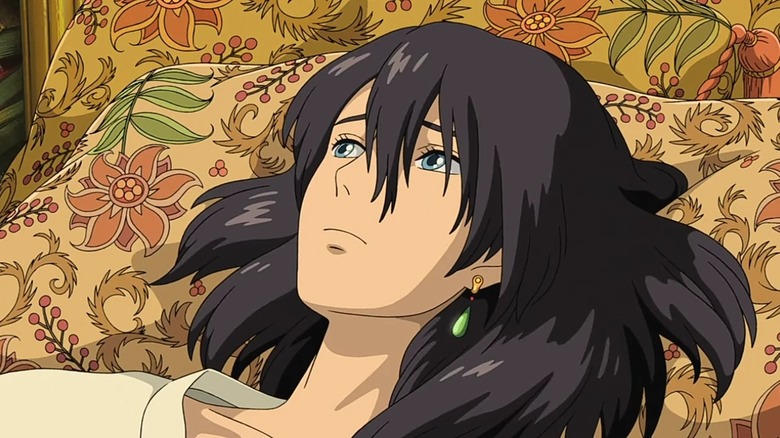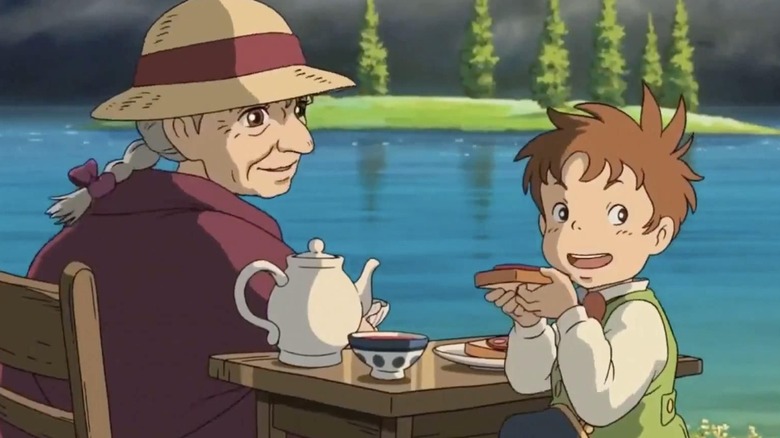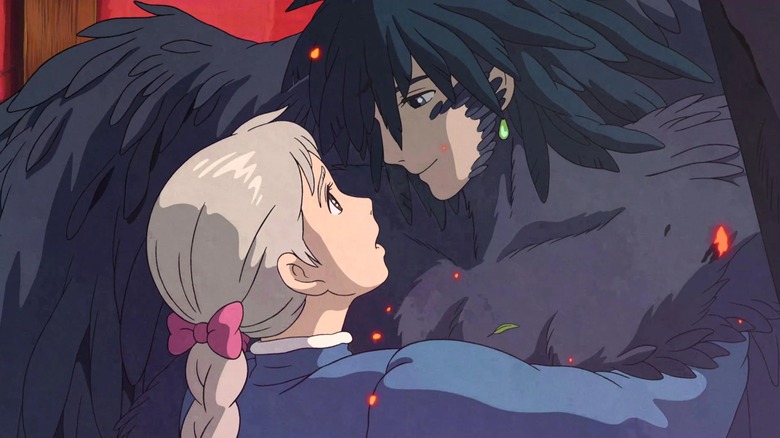Miyazaki's Most Underrated Masterpiece Deserves A Deep Dive
This post contains spoilers for "Howl's Moving Castle."
The Studio Ghibli aesthetic blueprint evokes a sense of nostalgia that is comforting to cling onto. Here, lush green meadows bloom with fantastical flowers, the innocence of childhood merges with the growing pains of adolescence, and the everyday wonders of sharing a warm weal or talking to a loved one cultivate a safe space like no other. When Hayao Miyazaki weaves a Ghibli tale, the spiritual and mundane come together to pave the path for surreal, unforgettable adventures, such as the one Chihiro embarks on in "Spirited Away," and Kiki is nudged towards in "Kiki's Delivery Service." Although every Miyazaki-helmed Ghibli offering is visually stunning; they transcend their singular aesthetic identity with complex, layered themes, tugging at the essential aspects of being human and what it means to embrace or turn away from this innate humanity.
At first glance, "Howl's Moving Castle" might seem like a telltale adventure that culminates in a love story, where the simplest expressions of affection have the power to thaw the coldest of hearts or change the world as we know it. However, the depth of "Howl's Moving Castle" extends far beyond Sophie's beautiful, bittersweet journey, as the horrors of war loom like a dark cloud over the central events — not just as a grim backdrop, but a brutal onslaught of terrors that impacts every aspect of the narrative. Miyazaki's uncompromising anti-war sentiments tint the colorful fabric of the film, where the futility inherent in such violence is underlined by the raging swirls of fire, ash, and soot that besmirch the picturesque scenery. As castles topple and cities are set ablaze, bleak desperation seeps into the fantastical, including the titular wizard of Ingary, who unwittingly drifts further away from his humanity.
Sophie's predicament, and the loss of the self
A milliner by profession, Sophie spends her days making beautiful hats at her store and often escapes the monotony of her work by visiting her sister Lettie. This routine is shattered when she encounters the charismatic, mysterious Howl, whose reputation grants him an almost mythic status, with tales of his cruelty being the subject of speculation among the town's populace. Before she can make sense of this enigma, she is cursed by the Witch of the Waste, who turns her into an elderly woman, robbing her of her youth and beauty. Eager to break the curse, she sets off on a journey with no destination, meeting souls along the way, until she enters Howl's floating castle and makes a deal with the fire demon, Calcifer, in an attempt to reclaim her identity.
It is crucial to note that Sophie's autonomy feels muted before she is cursed by the witch, as her self-concept is rooted in quiet doubts and insecurities. She struggles with self-confidence, considers herself unassuming despite never directly acknowledging it, and is content with existing in the shadows without being perceived. However, after being turned into an elderly woman, she is free from the expectations that come with being a young woman and is able to express herself without restraint. This reclamation of autonomy, which unfurls slowly but surely, allows Sophie to indulge in her vulnerabilities, allowing her compassion to shine through. The stereotypical attributes attached to old age dissolve, as Sophie finally feels like she is in control of her life, and that she belongs.
Her acts of compassion towards Howl are filtered through the lens of an old woman nurturing those around her, but her ability to break through Howl's defenses allows a new sentiment to bloom: love.
Howl's burden of self-isolation and the near-loss of humanity
Howl's reputation as a ruthless, powerful wizard precedes him, and Sophie's first encounter with him paints him as a figure in control of his image, suave and aloof. This guarded wariness crumbles once King Suliman summons him to fight in the war, and Sophie sees him for who he truly is: a scared youth taking refuge in his beautiful, messy room filled with magical trinkets, vulnerable like a child. As Sophie appears to him as an older woman, he confides in her, convincing her to pretend to be his mother in front of the King to evade the responsibilities of fighting a war. Howl's reluctance to fight lies in his fear of losing control and triggering consequences that cannot be undone, as the power that comes with being a wizard can lead to dangerous routes that he dares not venture into.
Pushed to action, Howl ventures out, disappearing into the smoke-filled skies to secretly thwart the war on both sides and transforming into a huge, bird-like creature to enact his power. However, these repeated transformations come at the price of his humanity, with each turn removing him further away from his compassionate self. Sophie's presence also introduces chaos in Howl's heart, as she is an ever-present reminder of beauty and warmth, even if she cannot perceive herself in that way. Torn between extremes, Howl plunges into self-isolation, shouldering the burden of stopping the war alone, even at the cost of his core self.
His core, of course, is connected to Calcifer, whose life is bound to Howl's as the fire demon represents his heart, keeping the hearth warm and the castle bustling with life. Once this fire is accidentally doused, Howl experiences near death, prompting Sophie to return his heart to him.
Compassion can be learned in Howl's Moving Castle
One of the most beautiful, heartbreaking scenes in "Howl's Moving Castle" is when Sophie falls into the chasm and travels to the past, where she sees Howl catching a falling star. This star, Calcifer, forges a magical contract with the young boy in exchange for his heart, and the two have been bound forever since. Although Howl and Calcifer's relationship is contentious at times — prompting the fire demon to make a deal with Sophie in exchange for freedom — there's also a hint of tenderness, vulnerability, and trust forging their relationship. In many ways, Calcifer is Howl's weakness, his Achilles Heel, capable of crushing everything he has if he's snuffed out or breaks free from the contract. In the end, he chooses to stay out of a sense of loyalty even after their contract is severed.
Just like Calcifer goes from a vengeful fire demon to a faithful friend, Howl also learns to lean into his compassion after the Witch of the Waste is turned into her true form, even though she pursues ulterior motives for the most part. The person responsible for such a change is Sophie, who is kind to the old woman despite having every reason to detest her. Sophie's inner workings are guided by a love for humanity in the backdrop of unchecked death and destruction, as she understands the value of extending warmth during such turbulent times, and clings to her humanity even when it's inconvenient to do so.
The fact that love can be such a primal, moving force might feel clichéd, but it underlines the power of a comforting touch or an act of kindness when one feels lost or undeserving of such a pure sentiment, or is forced to live without a literal heart.
In Miyazaki's world, to be loved is to be seen
To be loved is to be many things: to be pushed toward sensations that are uncomfortable yet essential, to be changed, to be held, to be engulfed in a sense of homecoming. In Howl and Sophie's case, to be loved is to be seen, where Howl is able to appreciate Sophie's enduring beauty and spirit despite her curse, and Sophie is able to sense Howl's childlike vulnerability and humanity when he is at the peak of monstrosity. Self-acceptance merges with the acceptance of another soul, where everyday insecurities and fears erode in the face of such a life-affirming emotion. War is the direct antithesis of this tender human truth, as seen when Sophie's peaceful reverie in the field of flowers is interrupted by a war machine, which hums with malicious intent and brings meaningless destruction with its advent.
While Howl's desperate, self-eroding flights into the battlefield submerge him in nihilism and transform him into a terrifying monster, the solution to resolving such a bleak situation comes in the form of a kiss. Sophie kisses the sentient scarecrow Turnip Head on the cheek, and he turns out to be the missing prince of the enemy nation, Justin, whose return heralds the end of dark times. Although Justin's romantic feelings for Sophie are never reciprocated, her affection for him is pure enough to break the curse. Love doesn't always have to be romantic or reciprocal to be meaningful, as Sophie sees Turnip Head as a being deserving of genuine affection.
In the end, Sophie's curse also breaks and she regains her youth, but her hair remains grey, a symbol of wisdom and experience. To love, and be loved, also leads to growth, and the courage to endure, no matter what.




